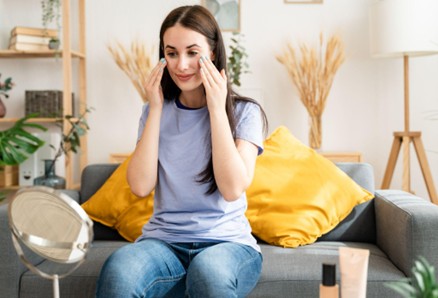-
 mederma@winmedicare.com
mederma@winmedicare.com
- No.1 Dermatologist Recommended Scar Brand
-
 Login
Login

Many people believe that sunscreen is only necessary outdoors, but this is not the case. Even when indoors, harmful UV rays can still affect your skin. Windows do not block all UV radiation, which means that exposure to these rays for longer periods can lead to premature ageing and skin damage.
Hence, the question remains: should you apply sunscreen at home? The answer is yes. Experts recommend using sunscreen indoors to maintain healthy skin and prevent long-term damage.
This blog explains the effects of indoor UV exposure, why sunscreen at home is essential, and how to choose and apply the right product. Understanding these factors helps in maintaining optimal skin health.
Many assume that staying indoors protects against UV radiation, but this is not entirely true. Two types of UV rays affect the skin:
Studies show that standard windows filter out only 25-40% of UVA rays, meaning you are still exposed even when inside. If you sit near a window, work under bright lights, or use digital screens, the effects of UV exposure increase. This makes sunscreen at home a necessary part of your skincare routine.
People often ask, “Can we apply sunscreen at home?” if they are not stepping outside. The simple answer is yes because indoor UV exposure adds up over time. Here’s why:
Therefore, using sunscreen at home prevents these harmful effects, keeping your skin healthy.
Now that we know it is necessary to apply sunscreen at home, selecting the right type is essential. Not all sunscreens work equally well indoors. Consider the following:
Using the right sunscreen indoors makes a noticeable difference in maintaining skin health.
Also Read – What is SPF and How to Choose the Right SPF For Skin Type
There are many misconceptions surrounding sunscreen at home. Here are some common myths debunked:
1.Myth: Indoor lighting does not affect the skin.
Fact: Fluorescent and LED lighting emit low levels of UV radiation, contributing to skin ageing over time.
2.Myth: I don’t need sunscreen if I work from home.
Fact: It is necessary to apply sunscreen at home, even while working. Sitting near a window exposes you to UVA rays, which accelerate ageing and increase the risk of skin damage.
3.Myth: Darker skin with high melanin does not require sunscreen
Fact: While melanin offers some protection, UV exposure can still cause hyperpigmentation and collagen breakdown.
4.Myth: Reapplication is unnecessary indoors.
Fact: Sunscreen breaks down over time, so reapplying every four to six hours is important, even when indoors.
Understanding these facts reinforces the need for sunscreen indoors as part of a daily routine.
Applying sunscreen at home is important, but additional measures can further safeguard your skin:
Combining these habits with the daily use of sunscreen indoors enhances protection against skin damage.
Using sunscreen indoors effectively requires proper application. Follow these steps:
Following these steps ensures that sunscreen at home provides maximum protection throughout the day.
Also Read – Difference Between Acne and Pigmentation
Acne, ageing, and pigmentation are common concerns, but protecting your skin is simple with daily sunscreen use. While it is necessary to apply sunscreen at home, this does not mean sun damage is completely unavoidable. Instead, regular sunscreen application helps reduce the effects of UV exposure and prevents premature ageing.
Using a high-quality sunscreen indoors as part of your skincare routine ensures long-term skin health. Pairing it with a hydrating moisturiser and avoiding excessive screen exposure can further improve results. Make applying sunscreen at home a habit and keep your skin protected every day.
Mederma offers scientifically proven skincare solutions. With Mederma Scar Cream + SPF 30, keep your skin healthy. Choose the right sunscreen today and maintain radiant skin year-round.